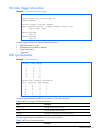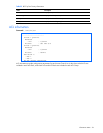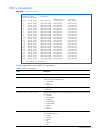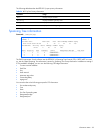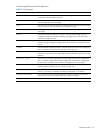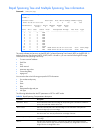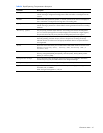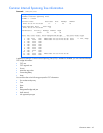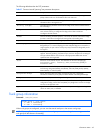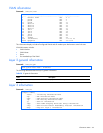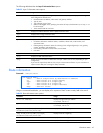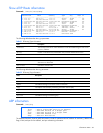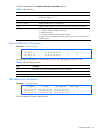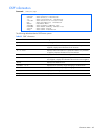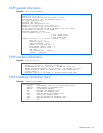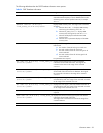
Information Menu 43
The following table describes the CIST parameters.
Table 27 Common Internal Spanning Tree parameter descriptions
Parameter Description
CIST Root Shows information about the root bridge for the Common Internal Spanning Tree
(CIST). Values on this row of information refer to the CIST root.
CIST Regional Root Shows information about the root bridge for this MSTP region. Values on this row of
information refer to the regional root.
Priority (bridge) The bridge priority parameter controls which bridge on the network will become the
STP root bridge.
MaxAge
The maximum age parameter specifies, in seconds, the maximum time the bridge
waits without receiving a configuration bridge protocol data unit before it
reconfigures the STP network.
FwdDel The forward delay parameter specifies, in seconds, the amount of time that a bridge
port has to wait before it changes from learning state to forwarding state.
Hops Shows the maximum number of bridge hops allowed before a packet is dropped.
Priority (port)
The port priority parameter helps determine which bridge port becomes the
designated port. In a network topology that has multiple bridge ports connected to a
single segment, the port with the lowest port priority becomes the designated port for
the segment.
Cost
The port path cost parameter is used to help determine the designated port for a
segment. Generally speaking, the faster the port, the lower the path cost. A setting of
zero (0) indicates that the cost will be set to the appropriate default after the link
speed has been auto-negotiated.
State
Shows the current state of the port. The state field can be one of the following:
Discarding (DISC), Learning (LRN), Forwarding (FWD), or
Disabled (DSB).
Role Shows the current role of this port in the Spanning Tree. The port role can be one of
the following: Designated (DESG), Root (ROOT), Alternate (ALTN), Backup (BKUP),
Master (MAST), or Unknown (UNK).
Designated Bridge Shows information about the bridge connected to each port, if applicable.
Information includes the priority (hex) and MAC address of the Designated Bridge.
Designated Port The port ID of the port on the Designated Bridge to which this port is connected.
Hello
The hello time parameter specifies, in seconds, how often the root bridge transmits a
configuration bridge protocol data unit (BPDU). Any bridge that is not the root bridge
uses the root bridge hello value.
Type Type of link connected to the port, and whether the port is an edge port. Link type
values are AUTO, P2P, or SHARED.
Trunk group information
Command: /info/l2/trunk
Trunk group 1, port state:
1: STG 1 forwarding
2: STG 1 forwarding
When trunk groups are configured, you can view the state of each port in the various trunk groups.
NOTE: If Spanning Tree Protocol on any port in the trunk group is set to forwarding, the remaining ports in the
trunk group will also be set to forwarding.



